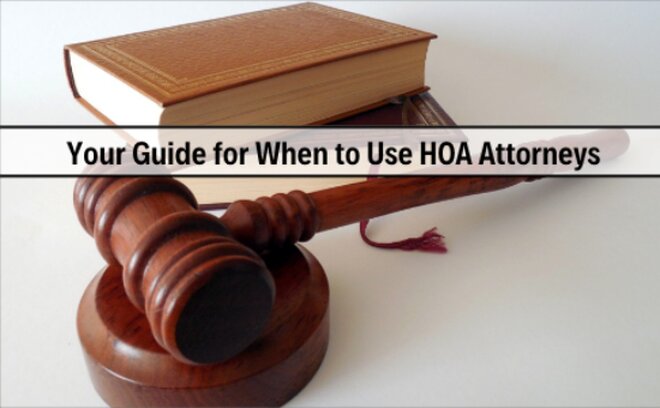Personal and business relationships are central to maintaining the fiscal health of the community, so it’s wise to pick battles well.

When to Seek Assistance from the HOA Attorney
The HOA attorney is an invaluable resource to turn to for advice on a plethora of topics, so if you have a firm you regularly confer with, stay with them. Larger property management companies generally engage with more than just one firm, depending on the size of the community. In most cases, it’s the property manager and the president who seek advice from the HOA attorney. This helps keep misunderstandings at a minimum (if other directors decide to contact the attorney independently) and it keeps legal expenses down. In case the directors are unaware of the protocol, the board must vote on who can contact the association attorney.
Property Managers: First Line of Defense
It’s always easier on the pocketbook and the nerves to seek amicable common ground in advance of taking legal action. If a homeowner disagrees with one of the HOA rules and complains to the board, it may simply be, within reason, easier for the board to change the rule rather than go through the unpleasantries of a lawsuit. Not only do lawsuits cost money, but they also create ill will between the homeowner and members of the board, as well as any other homeowners who may peripherally be involved in the proceeding. Many boards are not expert in the verbiage contained in their CC&Rs, so in this respect, property management will be as valuable a consultant as an attorney. At the very least, property managers will be able to dissect the problem and either confer with the board or forward the inquiry in a more digestible format to the HOA attorney. Because property managers have a legacy with the HOA and are impartial bystanders in a potential legal action, they can help steer the board to a simpler (and less stressful) solution.
Scenarios Making Legal Representation Necessary
At times, basic disagreements between a board and homeowner, vendor or a government entity can escalate to where legal advice is deemed virtually a necessity. Countless scenarios can land an HOA board in court, which is why the property manager is so important to act as an intermediary between the warring parties, to the best of his or her capability.
- Poor vendor performance resulting in non-payment
- Homeowner failing to follow rules or wishing to change rules
- Collection of fines and foreclosure notifications and proceedings
- Insurance claims
- Property damage
- Personal injury
- Board malfeasance or failure to fulfill fiduciary duties
- Government design review and special permits
If the property manager is not able to keep the HOA away from legal action, then a lawsuit may be necessary. It could be as relatively simple as the president having to appear in small claims court, or as complex (and rare) as a full jury trial.
Mediation Over Litigation
Because the vast majority of homeowners associations would prefer to avoid litigation, it’s up to the property management company to help the HOA find a viable alternative to the vagaries of legal action.
First, they need to be reminded of the cost of a protracted lawsuit. If a vendor has performed shoddy work resulting in further property damage to a group of condominiums, rather than sue for damages, write them a letter underscoring the board’s dissatisfaction and indicating that final payment will not be made. The association’s property management team can then contact the HOA’s insurance company to work with a contractor to pay for and repair the damages. While this may result in higher insurance premiums, it beats having each homeowner sue the HOA for potentially hundreds of thousands of dollars. Lawsuits can lay waste to a previously healthy reserve, which can negatively affect property values, so common sense is your friend in seeking the best resolution to legal issues.
Second, property management must emphasize to board members that legal entanglements take a great deal of time, robbing directors of productivity at both work and home. While a property manager can help, each individual HOA is a legal entity with the board as its ultimate decision maker and arbiter, so their involvement is a foregone conclusion.
Third, long-term legal issues can cause stress on the members of the board, especially the president, who carries a great deal more responsibility in these matters than the other directors. Not only will the HOA president suffer during this process, but the community as well because lawsuits can distract from other important duties. Neglect of duty can cause repercussions throughout the community, as the board may focus too much attention on the legal fight and not enough on the community at large.
And finally, a legal battle can harm relationships not just with homeowners, but with vendors and city officials as well. Personal and business relationships are central to maintaining the fiscal health of the community, so it’s wise to pick battles well. There is no such thing as a sure thing in the legal profession, with property managers providing a much-needed reality check to boards who want to go the court route before even considering more sensible options.
Ultimately, there is no substitute for face-to-face discussion between the two parties and getting whatever is decided in writing, whether it’s a disgruntled homeowner seeking a rule change or a vendor demanding payment. It may mean a longer board meeting to discuss these issues in front of homeowners, or an executive session to bring the parties together, perhaps with attorneys and property manager present, but these are still lower stress, lower cost alternatives to a months-long, or even years-long, legal imbroglio that can harm the community’s quality of life.
